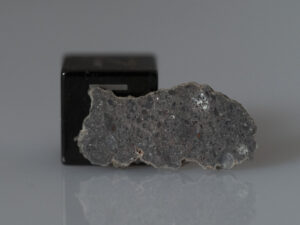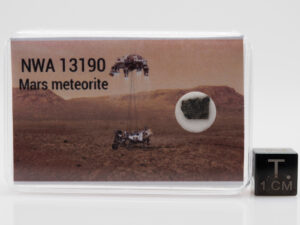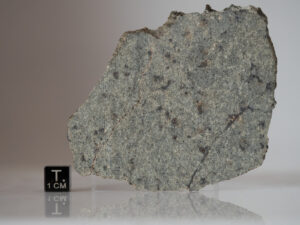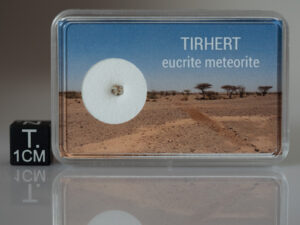Description
Tirhert 28.935°N, 8.905°W
Guelmim-Es-Semara, Morocco
Fell: 2014 Jul 9
Classification: HED achondrite (Eucrite, unbrecciated)
History: (H. Chennaoui Aoudjehane, A. Aaronson, M. Aoudjehane, A. Bouferra, A. Bouragaa) On Wednesday, 9 July 2014 around 9:30 pm, residents of Tirhert, Foum El Hisn, Douar Imougadir and nearby villages in southern Morocco, witnessed an intense fireball moving horizontally in a NW to SE direction and lasting about 4 s, shortly followed by multiple sonic booms. The fireball was seen by people from cities and villages more than 220 km around the fall site near Tirhert. Immediately following the fireball event the mayor and the authorities of the area organized a field search with police to check for possible security problems. The first meteorites were recovered the following day close to the road between Foum El Hisn and Assa. Thousands of people moved to the site from surrounding cities and villages to search, but many soon left because of the difficulties of searching during the hot 50°C daytime temperatures. The positions of many of the pieces were recorded from eyewitness testimonials, forming a roughly 6 × 3 km strewnfield trending NW to SE. The largest recorded mass around 1300 g was collected close to Tirhert at the coordinates listed for this entry. Recovered pieces weighed from 1 to 1300 g, with an estimated total mass of 8 to 10 kg. Most pieces are covered by a very shiny, black fusion crust.
Physical characteristics: Glassy black fusion crust with translucent patches revealing plagioclase grains beneath. Broken surface shows mm-size white plagioclase and honey brown pyroxene grains, also some scattered mm-size opaque grains. Friable.
Petrography: (C. Agee and N. Muttik, UNM) Microprobe examination of a polished mount shows texturally equilibrated pyroxene and plagioclase, granoblastic to poikilitic with many triple junctions. Pyroxenes show exsolution lamellae. Plagioclase and pyroxene grain size up to ~1-2 mm. Silica, ilmenite, chromite, troilite, and Fe-metal (low Ni) present. Fusion crust ~50-100 μm thick, vesicles up to 20 μm present, glassy with compositional gradients and swirls. (A. Irving, UWS) Optical petrographic examination of a thin section of a different specimen shows that it is composed of subequal amounts of pyroxene and twinned plagioclase with accessory opaque oxides and minor troilite. The overall texture is equigranular, but plagioclase occurs as aggregates of multiple subgrains, and some plagioclase contains clusters of tiny pyroxene inclusions. Magnetic susceptibility: Log χ = 2.53
Geochemistry: (C. Agee and N. Muttik, UNM) Low-Ca pyroxene Fs53.6±4.8Wo9.3±5.9, Fe/Mn=32±1, n=29; augite Fs30.3±1.3Wo39.2±1.0, Fe/Mn=33±2, n=15; plagioclase An89.9±0.9Ab9.6±0.9Or0.4±0.1, n=7. Fusion crust, proxy for bulk composition (mean value from EMPA with 20 μm beam) SiO2=48.25±0.99, TiO2=0.54±0.17, Al2O3=12.15±3.48, Cr2O3=0.22±0.04, FeO=19.32±2.82, MnO=0.58±0.09, MgO=7.72±1.21, CaO=10.09±1.14, Na2O=0.44±0.12 (all wt%), Mg#=41.6±0.5, n=23. Oxygen isotopes (Karen Ziegler, UNM): six acid-washed aliquots of bulk sample (1.3, 1.3, 2.4, 1.6, 1.7, 1.4 mg) analyzed by laser fluorination gave, respectively, δ17O = 1.524, 1.474, 1.106, 1.451, 1.286, 1.314, δ18O = 3.415, 3.233, 2.588, 3.268, 2.866, 2.961, Δ17O = -0.279, -0.233, -0.260, -0.275, -0.227, -0.249 (linearized, all permil).
Classification: Achondrite (unbrecciated gabbroic eucrite). Highly equilibrated with clear compositional separation of the low and high calcium pyroxenes consistent with type 6 eucrites (Takeda and Graham, 1991).
Specimens: 14 g at FSAC (0.6 g provided by A. Bouferra, 13.4 g provided by Aaronson); 41.4 g including a probe mount at UNM; 9 g including one polished thin section at UWB; 64.4 g in total for type specimens, and 72 g at ASU. Main masses are held by Aaronson and various private collectors. A. Habibi provided 25 g to UNM.





